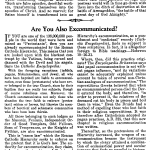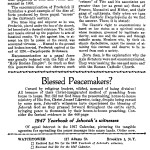Shunning is a formal decision by a denomination or a congregation to cease interaction with an individual or a group, and follows a particular set of rules. Shunning differs from, but may be associated with, excommunication. This is how Wikipedia describes shunning in a religious context.
Social rejection occurs when a group deliberately avoids association with, and habitually keeps away from an individual. This can be a formal decision by a group, or a less formal group action which will spread to all members of the group as a form of solidarity. It is a sanction against association, often associated with religious groups. Targets of shunning can include persons who have been labeled as apostates, whistle-blowers, dissidents, strike breakers, or anyone the group perceives as a threat or source of conflict. Social rejection has been established to cause psychological damage and has been categorized as torture.
Have Jehovah’s Witnesses always been proponents of shunning?
Let’s read what they said about excommunication in 1947:
The authority for excommunication, they [the Roman Catholic Hierarchy] claim, is based on the teachings of Christ and the Apostles as found in the following scriptures: Matthew 18:15-19; 1 Corinthians 5:3-5; 16:22; Galatians 1:8,9; 1 Timothy 1:20; Titus 3:10. But the Hierarchy’s excommunication, as a punishment and “medicinal” remedy (Catholic Encyclopedia) finds no support in these scriptures. In fact, it’s altogether foreign to bible teachings. Hebrews 10:26-31.
Where then did this practice originate? The Encyclopedia Britannica says that papal excommunication is not without pagan influence, “and its inadequacies cannot be adequately explained unless account be taken of several non-Christian analogues of excommunication.”
– Awake! (Jan 8, 1947) p. 27.
5 years after claiming that excommunication was a pagan punishment, Jehovah’s Witnesses employed its use. However, instead of calling the act “excommunication” they relabeled it as “Disfellowshipping”. Don’t try and find it in the bible. It is a non-biblical word. They also use the same scriptures that the Roman Catholic Hierarchy used; most notably 1 Corinthians 5:3-5 to justify the punishment.
Every year some 1% of Jehovah’s Witnesses are disfellowshipped and subsequently subjected to shunning. Of that number only one in three returns to the faith. For the two thirds who do not return, family and friends subject the individual to more intense shunning.
Shunning is to persistently avoid, ignore, or reject someone through antipathy or caution, according to one dictionary.
Witnesses who have been disfellowshipped are relentlessly subjected to shunning until they return to Jehovah’s Witness meetings and get re-instated. If they never return to the congregation of Jehovah’s Witnesses, they are subjected to shunning for the remainder of their lives.
How bad is shunning?
Shunning may be tolerable if it is only friends who avoid one who is disfellowshipped. But, it is extremely difficult to come to terms with disfellowshipping when parents, siblings or children subject the individual to shunning. Some have even committed suicide as they could see no other way out. The torture was just too intense.
When Jehovah’s Witnesses subject another to this form of torture, they usually have no idea why one has been disfellowshipped. Why? Beause no information is provided when an announcement is made at the disfellowshipped person’s Kingdom Hall. Furthermore, they believe that a disfellowshipped member has turned apostate or “loves the things of the world” if they never return. Obviously, because they are not allowed to speak to members who are subjected to shunning, they can never know for sure why one has never returned.
Further information:
In Paul’s second letter to the Corinthians, he wrote something very important that Jehovah’s Witnesses tend to ignore when they are shunning others:
2 Corinthians 2:5-11
Screenshots from the Awake! 1947, January 8, pages 27 & 28.

